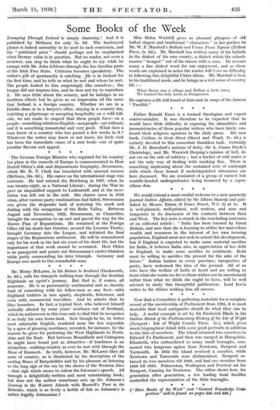The German Foreign Minister who regained for his country her
place in the councils of Europe is commemorated in Herr Rudolf Olden's able and dispassionate biography, Stresemann, which Mr. R. T. Clark has translated with unusual success (Methuen, 10s. 6d.). His career on the international stage was meteoric. He had entered the Reichstag in 1907, when he was twenty-eight, as a National Liberal ; during the War he gave an unqualified support to Ludendorff, and at the revo- lution was left out in the cold. His chance came in 1923 when, after various party combinations had failed, Stresemann was given the desperate task of restoring the mark and dealing with the occupation of the Ruhr Valley. Between August and November, 1923, Stresemann, as Chancellor, brought the occupation to an end and paved the way for the Dawes Plan of Reparations. He remained at the Foreign Office till his death last October, secured the Locarno Treaty, brought Germany into the League, and initiated the final stages of the Reparations settlement. He will be remembered only for his work in the last six years of his short life, but the importance of that work cannot be overrated. Herr Olden is no panegyrist and points out Stresemann's earlier blunders while justly commending his later triumph. Germany and Europe owe much to this remarkable man.
* * * *




















































 Previous page
Previous page